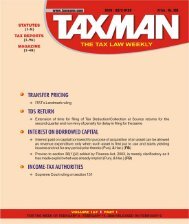news round up - Taxmann
news round up - Taxmann
news round up - Taxmann
- TAGS
- news
- round
- taxmann
- taxmann.com
You also want an ePaper? Increase the reach of your titles
YUMPU automatically turns print PDFs into web optimized ePapers that Google loves.
2010] State of Kerala v. Thrimathy Contracting Co. (Ker.) 207<br />
A<br />
B<br />
C<br />
D<br />
E<br />
F<br />
G<br />
entire work including these items will be treated as a civil work, entitling<br />
for payment of tax at compounded rate under section 7(7). [Para 2]<br />
Now the question for consideration would arise as to whether the work<br />
executed by the assessee was a part of the construction of the road, which<br />
alone would entitle it for concessional rate of tax under the scheme of<br />
compounding provided under section 7(7), because the work done was not<br />
in the nature of repair or maintenance of the road. Even though the<br />
contention of the assessee was to be accepted that paint marking on the<br />
highway was a requirement for opening the highway for traffic under the<br />
instruction issued by the Ministry of Surface Transport, it would have to be<br />
held that such marking did not constitute a part of the construction of the<br />
road. In the first place, marking is done after completion of the construction<br />
of the road and it is awarded under separate contract. In fact, existing roads<br />
are also marked with paints and it is invariably done when the road is<br />
declared as National Highway or State Highway. Therefore, paint marking<br />
is essentially a regulation introduced for smooth and safe vehicular<br />
movement and it is not a part of road as a structure. In fact, ever so many<br />
roads are constructed and maintained in the State without any paint<br />
marking, whatsoever. It cannot be said that such roads are maintained<br />
without completion of the construction. Therefore, marking of the road is<br />
not a part of the construction of the road and it is a post-construction work<br />
done for safe vehicular movement and the purpose is to guide the drivers<br />
and pedestrians using the road. [Para 3]<br />
Therefore, the revision was to be allowed by confirming the assessment<br />
sustained in the first appeal. [Para 4]<br />
Mohammed Raffiq for the Revision Petitioner. R. Ramadas for the<br />
Respondent.<br />
JUDGMENT<br />
C.N. Ramachandran Nair, J. - The question raised in the Sales Tax<br />
Revision filed by the State is whether the Tribunal was justified in holding<br />
that the work executed by the respondent, viz., s<strong>up</strong>plying and applying hot<br />
white thermoplastic road marking paint, marking of pedestrian crossing,<br />
zebra crossing etc. with white and yellow paints on road constitute civil<br />
works within the meaning of section 7(7) of the Kerala General Sales Tax<br />
Act, 1963 (for short ‘the K.G.S.T. Act’), entitling the respondent for payment<br />
of tax at compounded rate at 2 per cent. We have heard learned Government<br />
Pleader appearing for the petitioner and Sri Ramadas, appearing for<br />
the respondent.<br />
2. The work involved is awarded to the respondent by the Kerala Public<br />
Works Department for marking of National Highway with hot white and<br />
yellow thermoplastic road marking paint. Under the work schedule,<br />
payment is for every square feet of painting work done on road in terms<br />
of the instructions of the PWD. Admittedly, paint marking on road is<br />
through the middle and at pedestrian crossings with zebra marking and<br />
GOODS & SERVICES TAX CASES ❑ JANUARY 20 - FEBRUARY 4, 2010 ◆ 83











![“FORM NO. 3CEB [See rule 10E] Report from an ... - Taxmann](https://img.yumpu.com/45480232/1/190x245/form-no-3ceb-see-rule-10e-report-from-an-taxmann.jpg?quality=85)





